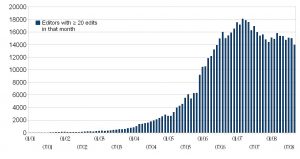The main discussion platforms in the Wikimedia community can be pretty insular. Lots of people write about their (often negative) experiences with and views on Wikipedia, and only a handful are part of Wiki Blog Planet, post on the Village Pump or the mailing lists, or hang out on freenode IRC. So I like to browse the wider world of Wikipedia blogging. Lots of other people do this too, I know, because usernames I recognize often appear in comments sections. Here’s what I found this time.
- Have You Ever Edited Wikipedia? – a thoughful post on notability by Terrance of The Republic of T. , explaining why he stopped contributing articles on victims of LGBT-related hate crimes.
- The coming Wikipedia election. – an interesting take on the way Wikipedia is increasingly significant for U.S. state-level politics, by an Virginia political junkie (User:WaldoJ).
- Is it safe to edit Wikipedia? – Kelly Martin’s Nonbovine Ruminations isn’t on the wiki blog aggregators any more, but she posted this a few weeks ago.
- final group project: editing USF’s wikipedia page – University of San Francisco media studies professor David Silver is running a Wikipedia assignment, group editing of the USF article. To be more precise, he’s grading it. The comments on his blog post are heartwarming. See how the USF article has changed since the assignment started two weeks ago.
Also, for those who haven’t seen it, Robert Rohde (User:Dragons flight) has some vital, long-wanted editing frequency statistics for the English Wikipedia community. The long and short of it is that the size of the Wikipedia editing community peaked around March 2007. I’ve been playing around with the data, and there are lots of interesting things hiding in there.

The big research/data crunching questions I have now relate to what the life course of a Wikipedia editor looks like? Anecdotally, active Wikipedians have a typical lifespan of a few years; most of the early contributors have left, and many of the most active editors today joined around the time I did or later (that is, in the 2005-2007 boom). Do many or most editors follow a typical pattern in their editing rate over the course of their involvement (e.g., rapid rise that levels off, then gradually declines before fading away)? Can we expect (or are we experiencing) a generational die-off in the wake of the exponential expansion period? What would a histogram of recent edits sorted by when editors joined look like?
Tougher questions that probably can’t be answered directly even with really great statistical analysis: Does Wikipedia attract a different kind of editor than it used to? How much of the pool of potential editors has been used up? Are there really significant numbers of potential editors who would contribute if usability issues were addressed?